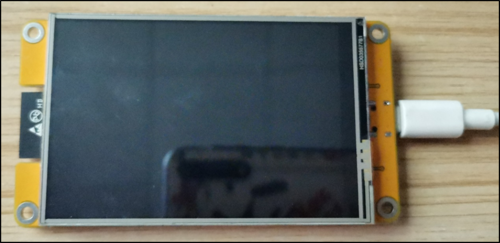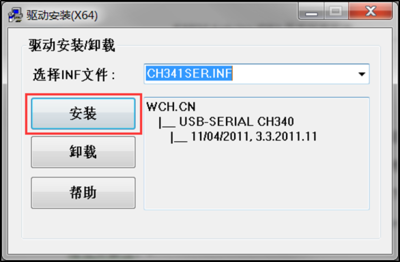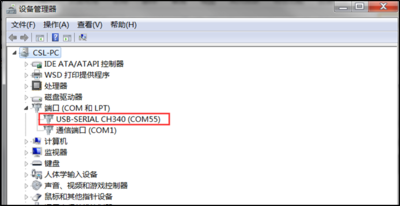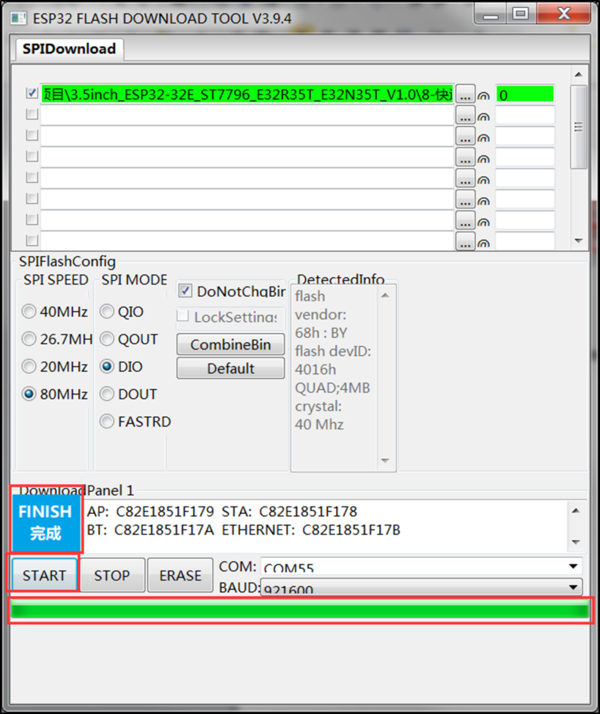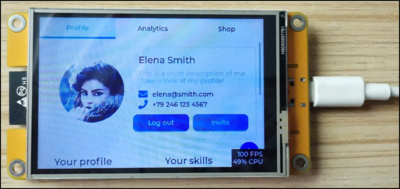More actions
Created page with " '''1.Download the Quick Start package''' A.Find the "'''Quick Use Instructions'''" section on the product webpage and click on the Quick Use kit link to download B.After downloading the data package, unzip the data package. The contents of the data package are as follows: 400x400px '''2. Power on the product''' ''' ''' Use the Type-C cable with power supply and data transmission function to connect the computer to the product and power t..." |
No edit summary |
||
| (2 intermediate revisions by the same user not shown) | |||
| Line 2: | Line 2: | ||
'''1.Download the Quick Start package''' | '''1.Download the Quick Start package''' | ||
A.Find the "'''Quick Use Instructions'''" section on the product webpage and click on the Quick Use kit | :A.Find the "'''Quick Use Instructions'''" section on the product webpage and click on the Quick Use kit | ||
link to download | ::link to download | ||
B.After downloading the data package, unzip the data package. The contents of | :B.After downloading the data package, unzip the data package. The contents of | ||
the data package are as follows: | ::the data package are as follows: | ||
[[File:Image-10.png|400x400px]] | :[[File:Image-10.png|400x400px]] | ||
::The '''bin''' folder contains the bin file to be burned. | |||
::The '''Flash_Download''' folder contains flash download tools. | |||
::'''USB-SERIAL_CH340. zip''' is the USB to serial port driver of the computer. | |||
'''2. Power on the product''' | '''2. Power on the product''' | ||
:Use the Type-C cable with power supply and data transmission function to connect the computer to | |||
the product and power the product. As shown in the picture below: | ::the product and power the product. As shown in the picture below: | ||
[[File:01.png|500x500px]] | :[[File:01.png|500x500px]] | ||
'''3. Install the USB-to-serial port driver''' | '''3. Install the USB-to-serial port driver''' | ||
A.Decompress the "'''USB-SERIAL_CH340.zip'''"package downloaded in Step 1, or download the | :A.Decompress the "'''USB-SERIAL_CH340.zip'''"package downloaded in Step 1, or download the | ||
"'''USB-SERIAL_CH340.zip'''"package from the tools section of the product web pageand decompress it | ::"'''USB-SERIAL_CH340.zip'''"package from the tools section of the product web pageand decompress it | ||
B. go to the folder after decompression, double-click "'''CH341SER.EXE'''" executable program, pop up the | :B.go to the folder after decompression, double-click "'''CH341SER.EXE'''" executable program, pop up the | ||
installation window, and then click "Install" button to continue the installation, as shown in the following picture: | ::installation window, and then click "Install" button to continue the installation, as shown in the following picture: | ||
[[File:02.png|400x400px]] | :[[File:02.png|400x400px]] | ||
C. After the installation is successful, click the window OK button to exit. Connect the computer USB to the | :C.After the installation is successful, click the window OK button to exit. Connect the computer USB to the | ||
development board and power on, and then enter the computer device manager, you can see that the | ::development board and power on, and then enter the computer device manager, you can see that the | ||
CH340 port is identified under the port, as shown in the following picture: | ::CH340 port is identified under the port, as shown in the following picture: | ||
[[File:03.png|400x400px]] | :[[File:03.png|400x400px]] | ||
'''4. Burn the bin file''' | '''4. Burn the bin file''' | ||
A. Locate the '''Flash_Download'''folder from the Quick use kit downloaded in Step 1, or Download the | :A.Locate the '''Flash_Download'''folder from the Quick use kit downloaded in Step 1, or Download the | ||
'''Flash_Download.zip''' package from the tools section of the product web page, decompress it, | ::'''Flash_Download.zip''' package from the tools section of the product web page, decompress it, | ||
and find the flash_download_tool folder, open the folder, and double-click the '''exe''' executable | ::and find the flash_download_tool folder, open the folder, and double-click the '''exe''' executable | ||
file of flash_download_tool. As shown in the picture below: | ::file of flash_download_tool. As shown in the picture below: | ||
[[File:04.png | :[[File:04.png|500x500px]] | ||
B. After opening the Flash download tool, ChipType select "'''ESP32'''",WorkMode select "'''Develop'''", | :B.After opening the Flash download tool, ChipType select "'''ESP32'''",WorkMode select "'''Develop'''", | ||
LoadMode keep the default (UART), and then click "'''OK'''" button, as shown below: | ::LoadMode keep the default (UART), and then click "'''OK'''" button, as shown below: | ||
[[File:05.png | ::[[File:05.png]] | ||
C. Enter the Flash download tool interface, first select the bin file to burn, The bin file is in the "'''bin'''" directory | :C.Enter the Flash download tool interface, first select the bin file to burn, The bin file is in the "'''bin'''" directory | ||
in the Quick use kit downloaded in Step 1, as shown in the following figure: | ::in the Quick use kit downloaded in Step 1, as shown in the following figure: | ||
[[File:Image-11.png]] | :[[File:Image-11.png]] | ||
D. Click the button with three dots in the middle to select the bin file in the above steps. After the selection, | :D.Click the button with three dots in the middle to select the bin file in the above steps. After the selection, | ||
check the box in the front and set the burning address as "'''0'''", as shown in the following picture: | ::check the box in the front and set the burning address as "'''0'''", as shown in the following picture: | ||
[[File:07.png | :[[File:07.png|600x600px]] | ||
E. Set SPI SPEED to "'''80MHz'''", SPI MODE to "'''DIO'''", and keep other Settings default, as shown in the following figure: | :E.Set SPI SPEED to "'''80MHz'''", SPI MODE to "'''DIO'''", and keep other Settings default, as shown in the following figure: | ||
[[File:08.png | :[[File:08.png|714x714px]] | ||
F. Set COM, as long as the product is normally connected to the computer, COM port will be automatically | :F.Set COM, as long as the product is normally connected to the computer, COM port will be automatically | ||
recognized, click the drop-down menu to select. Set BAUD, click the drop-down menu to select, | ::recognized, click the drop-down menu to select. Set BAUD, click the drop-down menu to select, | ||
the larger the value, the faster the burning speed, but can not exceed the maximum transmission | ::the larger the value, the faster the burning speed, but can not exceed the maximum transmission | ||
rate supported by the USB-to-serial chip. As shown in the picture below: | ::rate supported by the USB-to-serial chip. As shown in the picture below: | ||
[[File:09.png | :[[File:09.png|714x714px]] | ||
G. Click the "'''START'''" button to enter the burning state. During the burning process, the status changes: | :G.Click the "'''START'''" button to enter the burning state. During the burning process, the status changes: | ||
"'''Waiting for synchronous power-on'''" -> "'''Downloading'''" -> "'''FINISH'''", and the progress bar will also | ::"'''Waiting for synchronous power-on'''" -> "'''Downloading'''" -> "'''FINISH'''", and the progress bar will also | ||
be loaded, as shown in the following picture: | ::be loaded, as shown in the following picture: | ||
[[File:010.png | :[[File:010.png|714x714px]] | ||
'''5. | '''5.Run the program''' | ||
After the Bin file is burned, press the reset button of the product or power on the product again, | :After the Bin file is burned, press the reset button of the product or power on the product again, | ||
and you can see the operation effect of the program, as shown in the figure below: | ::and you can see the operation effect of the program, as shown in the figure below: | ||
[[File:011.png | :[[File:011.png|400x400px]] | ||
Latest revision as of 11:06, 15 September 2024
1.Download the Quick Start package
- A.Find the "Quick Use Instructions" section on the product webpage and click on the Quick Use kit
- link to download
- B.After downloading the data package, unzip the data package. The contents of
- the data package are as follows:

- The bin folder contains the bin file to be burned.
- The Flash_Download folder contains flash download tools.
- USB-SERIAL_CH340. zip is the USB to serial port driver of the computer.
2. Power on the product
- Use the Type-C cable with power supply and data transmission function to connect the computer to
- the product and power the product. As shown in the picture below:
3. Install the USB-to-serial port driver
- A.Decompress the "USB-SERIAL_CH340.zip"package downloaded in Step 1, or download the
- "USB-SERIAL_CH340.zip"package from the tools section of the product web pageand decompress it
- B.go to the folder after decompression, double-click "CH341SER.EXE" executable program, pop up the
- installation window, and then click "Install" button to continue the installation, as shown in the following picture:
- C.After the installation is successful, click the window OK button to exit. Connect the computer USB to the
- development board and power on, and then enter the computer device manager, you can see that the
- CH340 port is identified under the port, as shown in the following picture:
4. Burn the bin file
- A.Locate the Flash_Downloadfolder from the Quick use kit downloaded in Step 1, or Download the
- Flash_Download.zip package from the tools section of the product web page, decompress it,
- and find the flash_download_tool folder, open the folder, and double-click the exe executable
- file of flash_download_tool. As shown in the picture below:
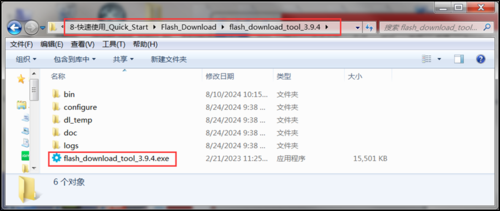
- B.After opening the Flash download tool, ChipType select "ESP32",WorkMode select "Develop",
- C.Enter the Flash download tool interface, first select the bin file to burn, The bin file is in the "bin" directory
- in the Quick use kit downloaded in Step 1, as shown in the following figure:
- D.Click the button with three dots in the middle to select the bin file in the above steps. After the selection,
- check the box in the front and set the burning address as "0", as shown in the following picture:
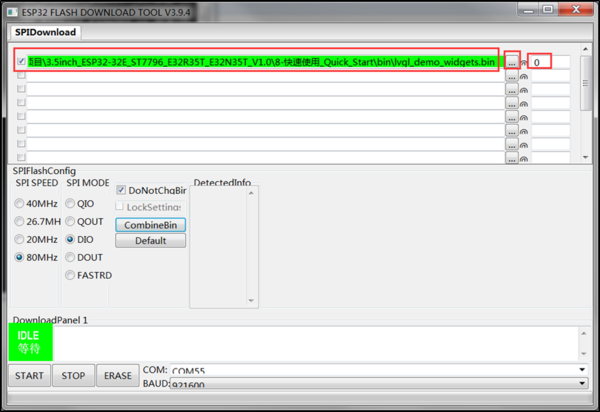
- E.Set SPI SPEED to "80MHz", SPI MODE to "DIO", and keep other Settings default, as shown in the following figure:
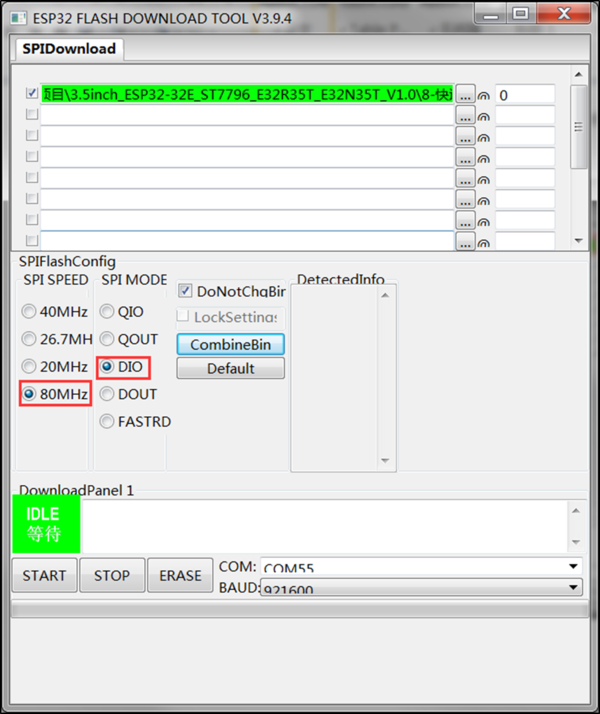
- F.Set COM, as long as the product is normally connected to the computer, COM port will be automatically
- recognized, click the drop-down menu to select. Set BAUD, click the drop-down menu to select,
- the larger the value, the faster the burning speed, but can not exceed the maximum transmission
- rate supported by the USB-to-serial chip. As shown in the picture below:
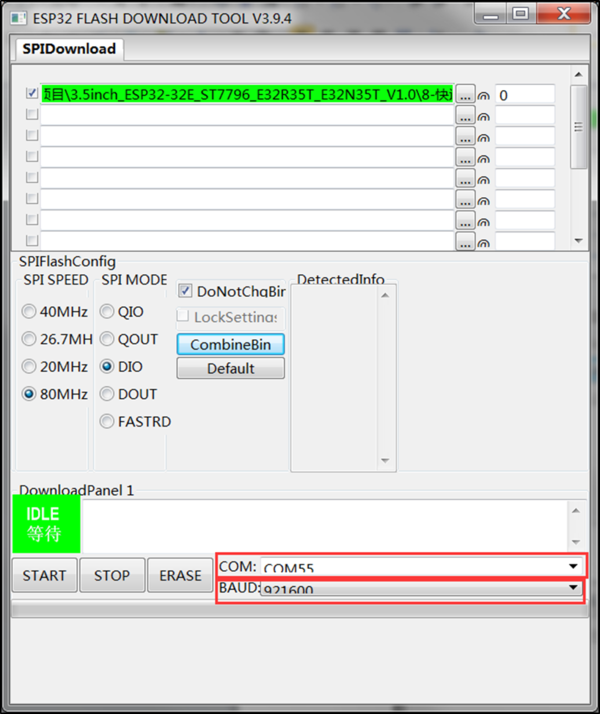
- G.Click the "START" button to enter the burning state. During the burning process, the status changes:
- "Waiting for synchronous power-on" -> "Downloading" -> "FINISH", and the progress bar will also
5.Run the program
- After the Bin file is burned, press the reset button of the product or power on the product again,

